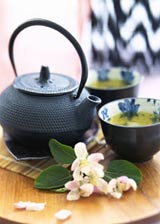Frequently Asked Questions
Q: How often after my first treatment do I have to come in?
A: Your doctor will instruct you according to your condition.
Q: If I can't get in to see my practitioner, can I pick up herbs or have herbs shipped to me?
A: It's important to avoid interrupting your treatment program. In the event that you miss your appointment, we encourage you to pick up a refill of your herbs or have them shipped to you to maintain treatment continuity.
Q: How long can I expect to be in the treatment room for an acupuncture treatment?
A: It depends on your practitioner's discretion. On average expect 45 to 60 minutes.
Q: Is it normal after an acupuncture treatment to get bruises or swelling on the area where the acupuncture needle was inserted?
A: Occasionally bruising or swelling may occur from an acupuncture treatment. Simply apply pressure and an ice pack for 10 to 15 minutes. It does not negatively impact your treatment's outcome.
Q: Can I exercise or go back to work after my treatment?
A: Yes, you may return to your normal activities shortly after your treatment.
Q: Can I take vitamins and other supplements while I take my herbs or will they conflict?
A: It's generally not a problem as long as you take the supplements and the herbs at separate times.
Q: How long after I eat should I wait to drink my herbal tea? Can I drink the tea on an empty stomach?
A: You should wait 15 to 20 minutes after your meal to drink the tea. It's fine to drink the tea on an empty stomach.
Q: What should I do if I slightly overcook the herbal tea or overcook it and end up with only one cup? Is it still good?
A: Overcooking is not a problem, as long as the tea is not burnt. If you only end up with one concentrated cup of tea, add filtered or distilled water to the concentrated tea to dilute it. Add enough water to the tea so that it equals to 3 to 6 cups (depending on the type of tea pot you use).
Q:What should I do if I forget to drink my tea for one dose?
A: You should double up the dose next time. It's important to take the prescribed dosage on a daily basis for optimum results.
Q: If I have more tea left over, do I throw it away or can I still drink it?
A: You should drink it, but keep in mind that once the tea is cooked it is only good for 1 week in the refrigerator.
Q: I am experiencing adverse reactions to the tea, such as abdominal pain and bloating. Is this normal and what should I do?
A: Let your practitioner know. Some people may have a reaction the first or second week, but symptoms usually subside afterwards.
Q: What kind of conditions can be treated with traditional Chinese medicine?
A: Following are conditions
commonly seen in the clinic, but acupuncture (including scalp acupuncture for neurological conditions and muscle spasms), herbs,
and Tuina (Chinese massage) can treat problems beyond this list.
If you have any questions about
whether your health concern is suitable
for treatment with traditional Chinese medicine, please call
for a free consultation.
NEUROLOGICAL
Headache, migraine, trigeminal
neuralgia, sciatic neuralgia,
intercostals neuralgia, post-operative
pain, phantom limb pain , peripheral
neuropathy, facial paralysis, seizures
& epilepsy, cerebral palsy, stroke residuals, multiple sclerosis,
Parkinson’s disease, enuresis,
impotence, incontinence, Meniere's syndrome, multiple sclerosis,
fibromyalgia
MUSCULOSKELETAL
Rheumatic arthritis, osteoarthritis,
tendonitis, bursitis, cervical syndrome, whiplash syndrome, backache, disk
problems, sciatica, shoulder pain,
tennis elbow, sprains, strains
GASTROINTESTINAL
IBS, diarrhea, constipation, nausea,
indigestion, abdominal pain, hyperacidity,
gastritis, ulcers, colitis,
weak digestive function, hemorrhoids
EAR, NOSE, DENTAL
Tinnitus, sinusitis, rhinitis, Meniere's
disease, toothache
GYNECOLOGICAL
Infertility, miscarriage prevention,
uterine fibroids, irregular menstruation,
menorrhea, menstrual cramps, amenorrhea
enorrhagia, leukorrhagia, menopausal
syndrome, breech position
MALE REPRODUCTIVE
Impotence, premature/nocturnal emissions,
prostate disorders
EMOTIONAL, PSYCHIATRIC
Stress, anxiety, depression, nervousness, neuroses, neurasthenia, insomnia
RESPIRATORY
Flu, common cold, asthma, bronchitis, sinusitis,
rhinitis
SKIN
Acne, rashes, urticaria, eczema,
shingles, neurodermatitis, psoriasis, wrinkles
ENDOCRINE
Hyperthyroidism, hypothyroidism,
diabetes
OTHER
Allergy, hay fever, sexual
dysfunction, addictive disorders,
smoking addiction, hypertension,
hepatitis, fatigue, weight control, health maintenance

